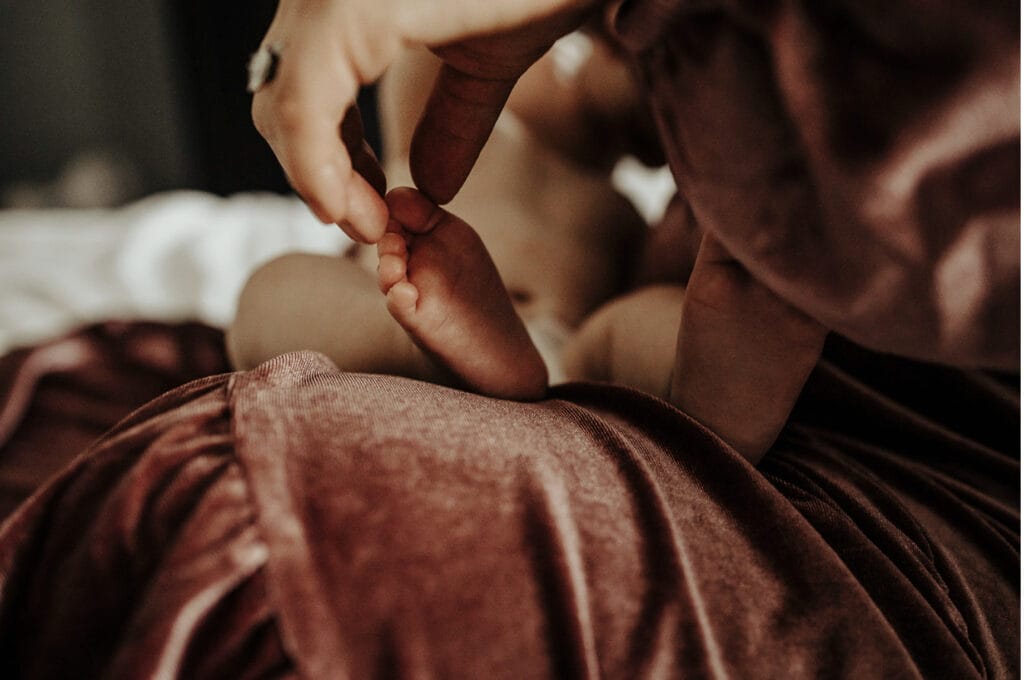
You just had a baby, congratulations! It’s no easy feat getting here. Whether your pregnancy was “easy” or you had a lot of complications, you’re now faced with the 4th trimester. What you’ll quickly learn is that the 4th trimester is a free-for-all on your body, mind, and baby! Common issues for mothers are postpartum depression or postpartum anxiety.
Mothers experiencing postpartum depression report an array of symptoms ranging anywhere from feeling less excitable and dull to having suicidal ideation or homicidal ideation. Mothers living through postpartum anxiety struggle to relax and must have their baby by them at all times.
Wherever you are on this spectrum, there is help! Mental health professionals can help you understand and manage your postpartum depression or postpartum anxiety symptoms and support you and your loved ones!
Postpartum depression and postpartum anxiety counseling can be provided to individuals, couples, or families. Postpartum depression and postpartum anxiety counseling can also be offered in support groups. At The Better You Institute, you can choose between in-person or online sessions with any of our mental health professionals.

Our Specialist For Postpartum Depression and Anxiety Therapy in Philadelphia
What is postpartum depression?
After having a baby, many women experience what is known as the “baby blues.” This normal and temporary condition is marked by weepiness, mood swings, and fatigue.
However, some women experience a more severe form of postpartum blues known as postpartum depression. Postpartum depression can last for weeks or even months after giving birth and can significantly impact a woman’s ability to function. Typical onset of baby blues is within the first couple of weeks of baby’s life, whereas postpartum depression’s onset tends to happen a bit later (average is three months postpartum).
Symptoms of postpartum depression include persistent sadness/depressed mood, withdrawing from loved ones and previously enjoyed activities, changes in appetite, anxiety, irritability, changes in sleeping patterns, feelings of hopelessness or worthlessness. More severe cases of postpartum depression leaves mothers feeling suicidal, homicidal toward her baby, intense anger, or dissociation. If you are experiencing any of these symptoms, it can be helpful to have the help of a healthcare provider. With the right treatment, most women can beat postpartum depression.

How do I know if I have postpartum depression?
There are many postpartum depression symptoms. These symptoms may overlap normal, hormonal shifts. This overlap in symptoms is why it could be beneficial to seek help from a trained professional. Some common symptoms include:
- Feeling sad or hopeless most of the time
- Difficulty bonding with your baby
- Withdraw from family and friends
- Reduced or loss of interest in activities you once enjoyed
- Difficulty sleeping, even when your baby is sleeping
- Feeling angry or irritable
- Feeling worthless or like a failure as a mother
- Poor concentration
- Thoughts of harm, death or suicide
- Thoughts of harming your baby or someone else
- Slower reactions to baby’s needs (e.g., letting baby cry instead of tending to its needs)
- Inability to care for self (e.g., not taking a shower when you have the chance, not eating enough or drinking water)
Substance Abuse
These symptoms may be indicative of the presence of postpartum depression. You may think to yourself that it’s “not that bad.” Seeking the help of a professional counselor can help manage your symptoms and provide support for yourself and your family. No matter how intense your symptoms feel, getting outside help can offer relief.
Postpartum depression facts:
- It is estimated that postpartum depression affects 1 in 7 women.
- Postpartum depression can occur any time during the first year after giving birth.
- Women with a history of depression or anxiety are at an increased risk of developing postpartum depression.
- Postpartum depression is treatable with professional counseling and support.
- Postpartum depression can be treated with medication. If you are breastfeeding, speak to your provider about safe levels/medications to be taking.



What is Postpartum Anxiety?
Postpartum anxiety is different from postpartum depression in that it is characterized by excessive worry and fearfulness. A woman with postpartum anxiety may be excessively worried about her baby’s health, safety, or development. She may also have fears about her own ability to care for her baby.
Postpartum anxiety can make it difficult to care for your baby and can interfere with bonding. Postpartum anxiety renders you exhausted as it is difficult to accept help as you may not trust others. If you do accept help, your postpartum anxiety will make it difficult to relax.
Some anxiety is helpful. For example, being prudent about your baby’s development by reading up on timing of certain motor skills is a good thing! If you find yourself Googling pictures of baby’s heads to see how your baby’s head compares for flat spots, or looking up pictures of tongue ties because something doesn’t feel right while you’re breastfeeding, you are being vigilant.

The difference in healthy anxiety vs. postpartum anxiety is a simple check on Google (healthy anxiety) or looking up pictures of tongue ties and comparing them to your baby, not seeing something, ask your partner and they don’t see something but you still make an appointment with an infant occupational therapist, lactation consultant, and pediatric dentist. The latter feels very necessary in the moment to an anxious postpartum mother. However, these extra steps in making sure your child is okay can be draining both mentally and physically. Having a psychotherapist can be valuable as you try to navigate these stressful, unfamiliar stages in your child’s life. A counselor can help check what is normal and what is excessive and will eventually burn you out.
Symptoms of postpartum anxiety include:
- Excessive worry or fearfulness
- Racing heart or rapid breathing
- Sweating or trembling
- Feeling overwhelmed or out of control
- Difficulty sleeping
- Nausea or stomach pain
- Lacking trust in others to care for your baby
- Watching your baby sleep out of fear not doting
- Checking your baby’s temperature frequently
- Not participating in self-care activities because you don’t want to leave your baby
How do I know if I have postpartum anxiety?
Postpartum anxiety is difficult to diagnose because what you’re doing feels normal. Try to take into account what others are telling you and read through the list of above symptoms, how many do you have? If you have more than two symptoms on the above list, it could be beneficial to call a healthcare provider for an evaluation. With the right treatment, most women can overcome postpartum anxiety.
Postpartum anxiety facts:
- An estimated 20% of women experience postpartum anxiety.
- Postpartum anxiety can occur any time during the first year after giving birth.
- Women with a history of anxiety or depression are at an increased risk of developing postpartum anxiety.
- Postpartum anxiety is treatable with professional counseling and support.
- Postpartum anxiety can be treated with medication. If you are breastfeeding, discuss with your healthcare provider options to treat your postpartum anxiety with medication and still breastfeed.


Is postpartum psychosis the same as postpartum depression?
Postpartum psychosis is a rare but serious condition that can occur after childbirth. It is marked by extreme mood swings, paranoia, delusions, and hallucinations. If you are experiencing any of these symptoms, it is important to seek medical help immediately.
Postpartum depression and postpartum psychosis are two different conditions after childbirth. Postpartum depression is more common, affecting 1 in 7, while postpartum psychosis is rarer, affecting only about 1 in every 1,000 women who give birth.
While both conditions should be taken seriously, postpartum psychosis can escalate quickly. Therefore, it is vital to get help as soon as you feel symptoms for your and your baby’s safety.
When to get a postpartum depression or postpartum anxiety screening?
Screening for postpartum depression and postpartum anxiety is a simple and quick process that can be done during a regular doctor’s visit or your check-up with your obstetrics team. If you are pregnant or have recently given birth, you should be getting screened for postpartum depression and anxiety at each check-up.
You will most likely be given the Edinburgh Scale. Your healthcare provider will ask questions about your mood and how you feel emotionally. If you are at risk for postpartum depression or postpartum anxiety, your healthcare provider will refer you to a mental health professional for further evaluation and treatment.
If your healthcare provider does not go over your mental health at your obstetric appointments or your postpartum appointments, you can advocate for yourself to have that discussion. You can ask them to provide you with the Edinburgh scale or an equivalent assessment they suggest.


What are the benefits of counseling for mothers with postpartum depression or postpartum anxiety?
For some women, postpartum depression or postpartum anxiety can be very serious and debilitating. You are not alone! Mother’s in the United States do not get the help they need and deserve to recover from childbirth. It makes sense that so many women have postpartum issues. However, postpartum depression and postpartum anxiety is treatable for most women with either counseling or medication, or both if you choose.
The benefits of getting treatment for postpartum depression and postpartum anxiety include:
- Feeling better emotionally and physically
- Having more energy and being better able to take care of yourself and your baby
- Developing a stronger bond with your baby
- Understanding your symptoms and how to manage them
- Learning healthy coping skills
- Increasing your self-esteem and sense of worth
- Improving your communication with your partner or caretaker
- Having someone who can tell you if what you’re experiencing is normal or a symptom of depression or anxiety
- Having a safespace to discuss the ups and downs of parenthood without feeling judged
- Identify what is postpartum depression or anxiety symptoms and matching a coping skills to that
- Getting help advocating for what you need surrounding your own care as well as the baby’s care
Managing your mental health
Managing your mental health after having a baby is vital for you and your child. If you think you may be suffering from postpartum depression or postpartum anxiety, don’t hesitate to reach out for help. Talk to your doctor or mental health professional about what you’re going through. Treating postpartum depression or anxiety allows you to feel like yourself again and be the best mother you can be.
Postpartum Depression and Postpartum Anxiety counseling in Philadelphia, PA
If you are struggling with postpartum depression, postpartum anxiety, or any other mental illness, counseling can help get your life back on track. With the help of one of our professional Philadelphia-based therapists, you don’t have to manage depression or anxiety alone. Take the first step towards your healing process and find support with The Better You Institute’s counseling center in Philadelphia, PA. Postpartum Depression and postpartum anxiety counseling sessions can take place in person or online depending on what makes more sense for you.


